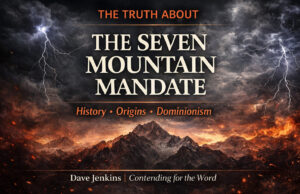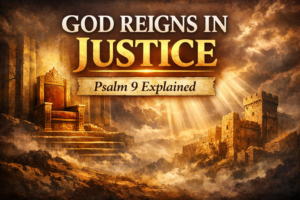⏱️ Estimated Reading Time: 4 min read
Humans are only personal because God is personal. Not only does He create us to have a relationship with him (otherwise how can it be a relationship), but in Genesis 2 God shows Adam how he can have one with other humans, namely his new wife Eve. In Genesis 2:24, God tells Adam and Eve just how deep this relationship between them should go, “Therefore a man shall leave his father and his mother and hold fast to his wife, and they shall become one flesh.”
However God is capable of having far deeper and more meaningful relationships that we cannot even begin to fathom. As Louis Berkhof states, “The original form of personality is not in man but in God…, what appears as imperfect in man exists in infinite proportion in God.”[i] No matter how hard I try, I could never know anyone as intimately and completely as God could – just read Psalm 139.
In addition to fellowship with God, we also come into union with God’s people. Christ brought us not only individually to him but he also created a people – bound together through his blood, see Eph 2:18-22. Our new fellowship and relationship with God’s people serves as the basis for relationships with others, especially other Christians – since we are one body together.
Pastor John Stott writes, “Thus the very purpose of his (Christ) self-giving on the cross was not just to save individuals, and so perpetuate their loneliness, but to create a new community whose members would belong to him, love one another, and eagerly serve the world.”[ii] Christ himself prayed to the Father that God’s people may be one even as he was one with the Trinity, “Holy Father, keep them in your name, which you have given me, that they may be one, even as we are one.” John 17:10b.
So it is logical that if love is the basis God’s relationship with us, it is also the foundation and model for our relationships with others. A Triune God enables us to establish loving and service-oriented relationships with one another, mirroring the one God has with us and with himself. In fact, the Trinity not only makes Biblical Servanthood possible, it defines how it should be carried out.
In 1 John 4:11-12, John goes so far as to say that when we love others, God (rather God’s image) is perfected in us. Follow the logic; if God is love and we are made in his image, then if we love, we project and perfect his image in us. Therefore, Trinity not only enables us to enter into relationships, it provides the very values to base them on. For example Paul writes in the book of Ephesians 5:2, “And walk in love, as Christ loved us and gave himself up for us, a fragrant offering and sacrifice to God.” Here, we see that loving others is based on the Son’s sacrifice, the Father’s acceptance, and the Spirit’s work. Our love for others is based on His love for us.
Bruce Ware in his book Father, Son, & Holy Spirit explains how the Trinity and the relationship within should inform our own relationships, “If we are to thus to represent God and reflect who he is in our relationships and activities, part of this involves reflecting the ways in which the triune Persons relate to one another. As we see the love and relationship among the Trinitarian Persons, we should seek the same kind of love to be expressed among us, God’s people…We are created to reflect what God is like, and this includes a reflection of the personal relationships within the Trinity.” [v]
In our reflection of the Trinity through love and service, we glorify God as we seek to be more like him. Indeed, we worship God as we seek to be perfected in his image because it communicates the very nature and power of God. This communicates and celebrates everything about the character of God, as well as our dependence on Him, first for salvation and then for works. Puritan Thomas Watson writes, “Glorifying God has respect to all the persons in the Trinity; it respects God the Father who gave us life; God the Son, who lost his life for us; and God the Holy Ghost, who produces a new life in us; we must bring glory to the whole Trinity.” [vi]



